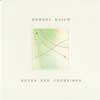 Simple, haunting, and frequently plaintive piano music is Robert Haigh's bread and butter. He's a master at making the most out of very little. His career is marked by memorable collaborations with Nurse with Wound, tape shenanigans as Truth Club, pseudo-new age adventures with Silent Storm, and numerous other projects, but his best music is undoubtedly for solo piano. Notes and Crossings is ostensibly a collection of preludes, dances, and improvisations, but the album's collective weight fosters a more cohesive sense. As with much of his work, Haigh's writing here is heavy and introspective, with hints of madness lurking beneath the surface, but it's also immediate and strangely catchy thanks to all the sharp, short, and effective melodies he produces.
Simple, haunting, and frequently plaintive piano music is Robert Haigh's bread and butter. He's a master at making the most out of very little. His career is marked by memorable collaborations with Nurse with Wound, tape shenanigans as Truth Club, pseudo-new age adventures with Silent Storm, and numerous other projects, but his best music is undoubtedly for solo piano. Notes and Crossings is ostensibly a collection of preludes, dances, and improvisations, but the album's collective weight fosters a more cohesive sense. As with much of his work, Haigh's writing here is heavy and introspective, with hints of madness lurking beneath the surface, but it's also immediate and strangely catchy thanks to all the sharp, short, and effective melodies he produces.
Robert Haigh's greatest strength is the simplicity of his writing. He deploys it to capture his audience's attention, then proceeds to deepen the character of his music with layers of intrigue and soul-searching exploration until the apparently simple is shown to be something deeper and more considerable. On the surface, Notes and Crossings is a beautiful and straightforward record, capable of communicating several moods quickly and effortlessly. This is because very little stands between Haigh's inspiration and his audience. Without accompaniment, Robert draws a surprisingly direct line from himself to whoever is listening. Hearing one of his songs is akin to hearing him whisper in my ear, with all the nuances of his speech condensed into lilting phrases and slowly evolving themes. Memorable melodies, ghostly harmonies, yearning phrases, and tense, frequently circular rhythms are often the only figures populating his songs, and with them he draws up a surprisingly diverse cast of expressions and feelings.
One song is clearly ponderous, circling slowly around the same tonal center, but afraid to land, and another is timid or doubtful, struggling to advance through a series of leaping rhythms. Still others are remorseful, bittersweet, happy, or resigned. That Haigh's music clearly conveys such a variety of emotions and ideas isn't terribly impressive, at least not by itself. But, that he does it on such a thin budget and without recourse to atonal contrivances or obviously mechanical means is impressive. His music is soulful, personal, and finally elaborate, mostly because Robert strives for the rare kind of honesty that is accompanied by ambiguity and delicacy. At the heart of Robert Haigh's music is Robert Haigh.
The album's title suggests miscellany, and the naming conventions for many of the songs also suggest that Notes and Crossings is a collection of ideas or sketches instead of a complete and coherent album. "Tomorrow Never Came" is evidently from 1989, and it's appearance adds to that impression. On the other hand, several songs are directly linked to one another, if not by title, then by musical themes. "Lost On a Train" and "Lost Again" are the most obvious cousins on the record, but both the "Invention" pieces and the several preludes found throughout help to form a web of references, which gives Notes and Crossings a unified air. Furthering the sense of completeness is a pervading mood of interiority cultivated by strokes of silence, both broad and minuscule. Haigh leaves ample space between his notes, both literally and figuratively, so that even the most composed of these songs feels wide open, thoughtful, and potentially improvised. Finally, I have a sense that much of the album was composed in the same key, or at least in a chain closely related keys. My musical ability isn't strong enough to identify which mode Haigh is working in, but the color of his music is very similar throughout, so that even if these songs were composed years apart, they would sound intimately related.
Still, Haigh's scales are not the sole agents responsible for the sense of unity that I think is so central to Notes and Crossings. By the end of the album, Robert has concocted a hazy, dizzy, and somnambulant mixture of romantic music and deeply personal utterances. His sense of space and composition have a lot to do with that, as do his melodies, but the album also harbors a particular and unique spirit. Thanks to the honesty and directness of Haigh's writing, Notes and Crossings feels like a personal invitation, animated by a language that belongs only to him and perhaps a few others (mostly his influences). By marrying technique, spirit, and honesty so completely, Robert accomplishes a purity of expression that is simultaneously candid and mysterious. Every remark is overdetermined with meaning, but never pretentiously nor ostentatiously so. His music is perched on a difficult and twisted peak, with self-parody and melodrama threatening on every side. Robert never succumbs to those dangers, however, and he produces some of the most beautiful music I've ever heard as a result.
samples:
 
Read More

